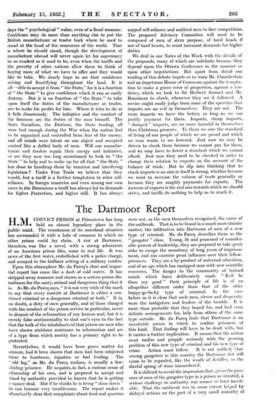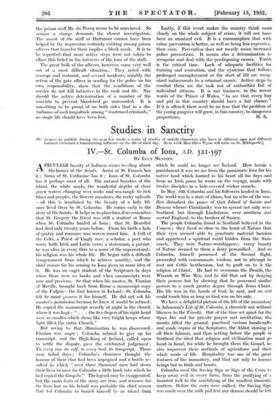The Dartm oor Report A4 CONVICT PRISON at Princetown has
long -1--1-.11-1-• held an almost legendary place in the public mind. The remoteness of its moorland situation has surrounded it with a halo of romance to which no other prison could lay claim. A riot at Dartmoor, therefore, was like a novel, with a strong admixture of an American prison film, come to real life. It was news of the first -water, embellished with a police charge, and arrayed in the brilliant setting- of a military cordon.
Upon this atmosphere Mr. 4.1u Pamq's clear and impar- tial report has come like -a dash of cold water. It has stripped away romance and shown us a serious prison dis- turbance for the nasty, animal and dangerous thing that it is. As-Mr, du Parcq says, " it is not very wide of the mark to say that every convict at -Dartmoor is either a con- firmed criminal or a dangerous criminal or both." It is, no doubt, a duty of men generally, and of those charged with the conduct of the prison service in particular, never to despair of the reformation of any human soul, but it is merely false sentimentality to shut one's eyes to the fact that the bulk of the inhabitants of that prison are men who have shown stubborn resistance to reformation and are of a type from which society has a primary right to be protected.
Nevertheless, it would have been grave matter for censure, had it been shown that men had been subjected there to harshness, injustice or bad feeding. The " old lag," as Mr. du Parcq realizes, is usually a law- abiding prisoner. He acquires, in fact, a curious sense of citizenship of his own, and is prepared to accept and stand by authority provided he knows that he is getting a square deal. But if he thinks he is being " done down " he can become very troublesome. The report makes it abundantly clear that complaints about food and quarters were not, as the men themselves recognized, the cause of the outbreak. That is to be found in a much more sinister matter, the infiltration into Dartmoor of men of a new type of criminal. Mr. du Parcq describes them as the ." gangster " class. Young, fit and possessed of consider- able powers of leadership, they are prepared to take great risks to escape the monotony of long years of imprison- ment, and can exercise great influence over their fellow- prisoners. They are a by-product of universal education, and of an age which has equipped man with new scientific resources. The danger to the community of trained minds which have deliberately made " Evil be thou my good " their principle of life is of an -altogether different order from that of the older happy-go-lucky type of criminal. In the case .before us it is clear that such men, clever and desperate, were the instigators and leaders of the trouble. It is more than probable that they hoped for, and had even definite arrangements for, help from others of the same type outside. Mr. du Parcq finds that Dartmoor is an unsuitable prison in which to confine prisoners of this kind. That finding will have to be dealt with, but it carries a further implication. It means that the nation must realize and grapple seriously with the growing problem of this new type of criminal and his new type of crime. Action must follow. It is not unlikely that among gangsters in this country the Dartmoor riot will come to be regarded, like the wrath of Achilles, as the direful spring of woes unnumbered.
It is difficult to avoid the impression that, given the pres- ence of men of the gangster type in a prison so situated, a Serious challenge to authority was sooner or later inevit- able. That the outbreak was to some extent helped by disloyal actions on the part of a very small minority of
the prison staff Mr. du Parcq seems to be convinced. So serious a charge demands the 'closest investigation; The morale of the staff at Dartmoor cannot have been helped by the impression certainly existing among prison officers that transfer there implies a black mark. It is to be regretted that more active steps were not taken to efface this belief in the interests of the tone of the staff.
The great bulk of the officers, however, came very well out of a most difficult situation. They acted with courage and restraint, and several incidents, notably the action of the gate officer in sending for the police on his own responsibility, show that the conditions of the service 'do not kill initiative in the rank and file. Nor should the active determination of a number of the convicts to prevent bloodshed go unrecorded. It is something to be proud of on both sides that in a dis turbanee of such magnitude among " eon firn led criminals," no single life should have been lost, Lastly, if this event makes the country think more clearly on the whole subject of crime, it will not have been an unmixed evil. It is a commonplace that with crime prevention is better, as well as being less expensive, than cure. Prevention does not merely mean increased police precautions. It means also a determination to recogniie and deal with the predisposing causes. YOUth is the critical time. Lack of adequate facilities for training and recreation, and the cynicism that follows prolonged unemployment at the start of life arc recog- nized induceinents to a criminal career. Active steps to combat them are the task not of authorities but of individual citizens. It is our business; in the recent words of the Prince of Wales, " to sec that every boy- and girl in this country should have a fair chance."- If it is offered, there need be no fear that the problem of the young gangster will grow, in this country, to dangerous







































 Previous page
Previous page